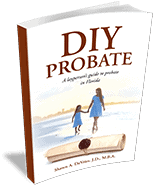What Is Probate In Florida? Is There More Than One Type Of Probate?

DIY Probate A Layperson`s Guide to Probate in Florida
Sometimes, when a family member passes away, the court has to decide where the deceased person’s things should go. Probate is when the court has to determine who receives the assets of that family member who has recently passed away. There are three types of probate in Florida: Disposition without Administration, Summary Administration, and Formal Administration.
Disposition Without Administration is the most simple type of Probate, which is essentially an order that a judge signs, granting an asset to someone who has paid the funeral bills and/or end-of-life bills for the decedent.
The next type of probate is Summary Administration, which is typically done in cases where there is less than $75,000 in assets, not including any homestead real estate or homestead exempt property. Homestead real estate is typically the home in which the decedent one lived at the time of death (if they owned the home).
The third type, and most complex and detailed probate, is Formal Administration, which is done in cases where there is more than $75,000 in assets.
What Factors Set The Stage For Probate To Occur In Florida?
During probate, there are two types of Estates: Intestate & Testate. Intestate Estate is when the loved one passed away without a will. When this occurs, Florida statute determines who is going to receive the property. Testate is when the loved one passed away with a will, and the will determines who they wanted to have receive their property. In order for probate to occur, there has to be tangible personal property such as motor vehicles or home goods that needs to be disposed of or transferred to another person, and/or bank accounts without assigned beneficiaries.
Is Probate Always Necessary?
Probate is not always necessary in Florida; many attorneys try to create estate plans to help avoid probate whenever possible. However, if there are bank accounts without beneficiaries, or real property owned within the state of Florida, then there is likely going to be a probate.
Does All Of The Deceased Person’s Property Go Through Probate?
Not all of the decedent’s property will go through probate. Bank accounts with beneficiaries would pass outside of probate (i.e. the bank would immediately give the assets of the account to the beneficiary); the same is true for brokerage accounts and life insurance policies.
In addition, real property that is jointly titled as husband and wife or as joint tenants with the right of survivorship would transfer to the remaining tenant without passing through probate. Lastly, if the decedent executed an enhanced life estate deed (some attorneys also call it a ladybird deed), then they may have transferred that property before passing away; under such circumstances, that property would not go through probate.
Are There Options For Avoiding Probate?
There are options for avoiding probate. The most important thing to do is discuss the options with an attorney before the person passes away. A discussion can be had about what would need to go through probate, what wouldn’t need to go through probate, and the best way to ensure that probate is avoided.
The role of a Will in Probate
A Will is a legal document that describes a person’s wish as to how their belongings will be disbursed after their death. In the will, the decedent also gives a clear directive on who (executor) will manage the estate until its final distribution.
A Will doesn’t always cover all the aspects of proper estate settlement. For instance, the decedent may own assets that still need to go through probate even though there’s a Will. Also, there may be unpaid debts that need to be settled.
Realistically Speaking, Could Someone Navigate The Probate Process In Florida On Their Own? What Are Some Things That You’ve Seen Go Wrong When People Try To Go It Alone?
Florida law requires all personal representatives to have an attorney represent them in a probate. Therefore, in order to open up a probate in Florida, you’re going to need to hire an attorney. The only time when that wouldn’t be an issue is when the personal representative is an attorney themselves.
How Are Attorney Fees Determined For Probate In Florida?
Attorney fees are set under Florida statute 733.6171; I would recommend that anyone who has questions about the cost of probate review the language in this statute.
For more information on Probate, an initial consultation is your next best step. Get the information and legal answers you are seeking by calling (904) 348-0030 today.
